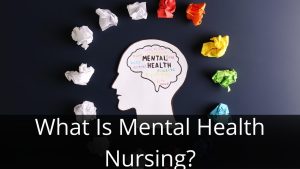What is mental health nursing?
Mental health nursing is a type of nursing that focuses on the mental and emotional well-being of patients. Mental health nurses are often responsible for helping people understand how their feelings, thoughts, and behaviours affect their health and well-being. Mental health nurses assess the mental status of patients, provide support for those with mental illness or addiction, help individuals cope with traumatic events, and promote healthy living.

Mental health nurses are employed in a variety of settings, including hospitals, psychiatric clinics, schools and universities, rehabilitation centres, community organizations (such as the American Red Cross), and private practice.
Mental health nurses are often required to work long hours and may be on-call during off-hours. They also must have a strong knowledge base on mental illnesses, including depression, bipolar disorder, schizophrenia, anxiety disorders, and addiction.
The job outlook for mental health nurses is strong. The U.S. Bureau of Labor Statistics projects that employment in the field will grow by 22 per cent between 2010 and 2020, much faster than the average for all occupations. Mental health nurses will be needed to fill positions created by an increase in demand for mental health services due to the aging of the baby boom generation.
Mental health nurses work to ensure the well-being of their patients
Mental health nurses work to ensure the well-being of their patients. They are often responsible for caring for people with mental illness or intellectual disabilities. Mental health nurses also provide advice, guidance, and support to patients, families, and careers. Mental health nurses are also involved in research into mental illness and treatments.
Access to mental healthcare is improving all the time
Nurses play a crucial role in mental healthcare as they are often the first point of contact for people with mental health problems. Nurses have to be aware that there are many different types of mental health problems and they will need to seek the appropriate help for each person. Mental health nursing is a challenging area of nursing due to its complexity, but it can be rewarding if approached in the right way.
What are the biggest risks of mental health nursing?
The main risks for mental health nurses are:

Overcoming these risks may be difficult, but it is possible and will help to ensure that the best standards of care can be delivered. Mental health nurses should be aware that there are many different types of mental health problems and they will need to seek the appropriate help for each person. Mental health nursing is a challenging area of nursing due to its complexity, but it can be rewarding if approached in the right way.
The standard of mental health nursing is not always up to par
The standard of mental health nursing is not always up to par. Nurses often lack education and skills in this area, which can lead to errors that could be avoided with the proper training. The demands for mental health nurses are also high, and there is a shortage of qualified professionals to fill the demand. Mental health nursing can be very rewarding and challenging at times, but it is important to understand the risks involved with this type of nursing before deciding if it is right for you.
The biggest risk in mental health nursing is a lack of education and training that could lead to errors in judgment and care. A nurse can make a mistake with treatment or medication, which could cause harm to the patient. Mental health nurses also need to know how to handle potentially violent situations when dealing with patients.
A mental health nurse may also be at risk of developing depression or anxiety themselves, due to the nature of their job and working with mentally ill patients. There is a high rate of depression among mental health nurses, which could lead to the nurse needing treatment for their own issues.
Companies providing mental health nursing services are not always well-being focused
Mental health nursing is a field of nursing that provides care for those who are experiencing mental illness or have other psychiatric problems. Mental health nurses work with patients to help them recover and learn how to cope with their illnesses. They also help patients to avoid relapses and recurrences of mental illnesses, as well as provide community outreach services for those who need them.
There is a lack of understanding about what constitutes good mental health nursing practice
The lack of understanding about what constitutes good mental health nursing practice is the biggest risk for nurses. Nurses must know how to recognize and respond to signs of poor mental health, including substance abuse, depression, and suicidal thoughts.
This lack of understanding is dangerous because it limits the ability to provide high-quality care for patients with mental health issues.”
Mental health patients have a limited choice when it comes to services
Mental health patients have a limited choice when it comes to services. There are many treatments available for mental illness such as psychotherapy and medication, but not all of them work for every patient. This can lead to a lot of frustration for the patient who is trying to find something that will work.
Just because there are many choices doesn’t mean they are all good ones.
How can nurses reduce these risks?
Nurses are in a position to reduce the risks of mental health nursing by making sure that patients have access to services that will help them. They can also make sure that patients know what options they have and what the risks are of each one.
Nurses can also help patients find a treatment that works for them by listening to their concerns and helping them make decisions based on those concerns. They can also make sure that patients have access to the treatments they need.
They can do this by encouraging their patients to take part in the treatment and by helping them find a treatment that will work for them. They can also help their patients find ways to deal with the side effects of their treatments.
Nurses can also help reduce risks by teaching patients and caregivers how to avoid or control stress, anxiety, and depression. They can help their patients find ways to cope with stress, anxiety, or depression that do not involve drugs.
Nurses can also help reduce risks by helping their patients learn how to use alcohol or drugs in a safe way.
Nurses can also help reduce risks by helping their patients learn how to eat healthy foods and get regular exercise. They can teach them ways to deal with stress, anxiety, or depression that do not involve alcohol or drugs.
Nurses can also help reduce risks by helping their patients learn how to use alcohol and drugs in a safe way. They can help their patients learn how to eat healthy foods and get regular exercise. They can teach them ways to deal with stress, anxiety, or depression that do not involve alcohol or drugs.




